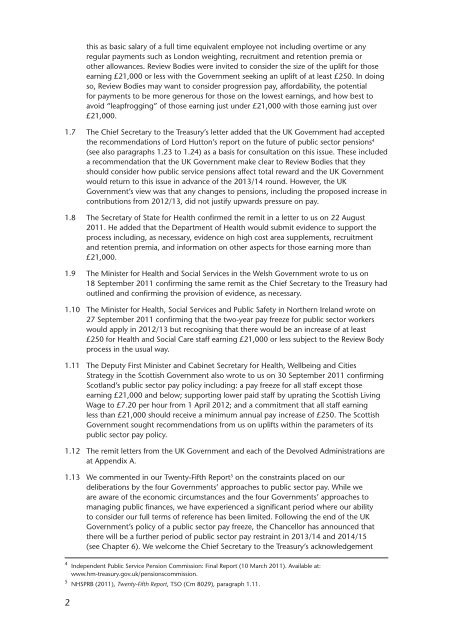NHS pay review body: twenty-sixth report 2012 - Official Documents
NHS pay review body: twenty-sixth report 2012 - Official Documents
NHS pay review body: twenty-sixth report 2012 - Official Documents
You also want an ePaper? Increase the reach of your titles
YUMPU automatically turns print PDFs into web optimized ePapers that Google loves.
1.7<br />
1.8<br />
1.9<br />
2<br />
this as basic salary of a full time equivalent employee not including overtime or any<br />
regular <strong>pay</strong>ments such as London weighting, recruitment and retention premia or<br />
other allowances. Review Bodies were invited to consider the size of the uplift for those<br />
earning £21,000 or less with the Government seeking an uplift of at least £250. In doing<br />
so, Review Bodies may want to consider progression <strong>pay</strong>, affordability, the potential<br />
for <strong>pay</strong>ments to be more generous for those on the lowest earnings, and how best to<br />
avoid “leapfrogging” of those earning just under £21,000 with those earning just over<br />
£21,000.<br />
The Chief Secretary to the Treasury’s letter added that the UK Government had accepted<br />
the recommendations of Lord Hutton’s <strong>report</strong> on the future of public sector pensions4 (see also paragraphs 1.23 to 1.24) as a basis for consultation on this issue. These included<br />
a recommendation that the UK Government make clear to Review Bodies that they<br />
should consider how public service pensions affect total reward and the UK Government<br />
would return to this issue in advance of the 2013/14 round. However, the UK<br />
Government’s view was that any changes to pensions, including the proposed increase in<br />
contributions from <strong>2012</strong>/13, did not justify upwards pressure on <strong>pay</strong>.<br />
The Secretary of State for Health confirmed the remit in a letter to us on 22 August<br />
2011. He added that the Department of Health would submit evidence to support the<br />
process including, as necessary, evidence on high cost area supplements, recruitment<br />
and retention premia, and information on other aspects for those earning more than<br />
£21,000.<br />
The Minister for Health and Social Services in the Welsh Government wrote to us on<br />
18 September 2011 confirming the same remit as the Chief Secretary to the Treasury had<br />
outlined and confirming the provision of evidence, as necessary.<br />
1.10 The Minister for Health, Social Services and Public Safety in Northern Ireland wrote on<br />
27 September 2011 confirming that the two-year <strong>pay</strong> freeze for public sector workers<br />
would apply in <strong>2012</strong>/13 but recognising that there would be an increase of at least<br />
£250 for Health and Social Care staff earning £21,000 or less subject to the Review Body<br />
process in the usual way.<br />
1.11 The Deputy First Minister and Cabinet Secretary for Health, Wellbeing and Cities<br />
Strategy in the Scottish Government also wrote to us on 30 September 2011 confirming<br />
Scotland’s public sector <strong>pay</strong> policy including: a <strong>pay</strong> freeze for all staff except those<br />
earning £21,000 and below; supporting lower paid staff by uprating the Scottish Living<br />
Wage to £7.20 per hour from 1 April <strong>2012</strong>; and a commitment that all staff earning<br />
less than £21,000 should receive a minimum annual <strong>pay</strong> increase of £250. The Scottish<br />
Government sought recommendations from us on uplifts within the parameters of its<br />
public sector <strong>pay</strong> policy.<br />
1.12<br />
The remit letters from the UK Government and each of the Devolved Administrations are<br />
at Appendix A.<br />
5 1.13 We commented in our Twenty-Fifth Report on the constraints placed on our<br />
deliberations by the four Governments’ approaches to public sector <strong>pay</strong>. While we<br />
are aware of the economic circumstances and the four Governments’ approaches to<br />
managing public finances, we have experienced a significant period where our ability<br />
to consider our full terms of reference has been limited. Following the end of the UK<br />
Government’s policy of a public sector <strong>pay</strong> freeze, the Chancellor has announced that<br />
there will be a further period of public sector <strong>pay</strong> restraint in 2013/14 and 2014/15<br />
(see Chapter 6). We welcome the Chief Secretary to the Treasury’s acknowledgement<br />
4<br />
Independent Public Service Pension Commission: Final Report (10 March 2011). Available at:<br />
www.hm-treasury.gov.uk/pensionscommission.<br />
5<br />
<strong>NHS</strong>PRB (2011), Twenty-Fifth Report, TSO (Cm 8029), paragraph 1.11.
















